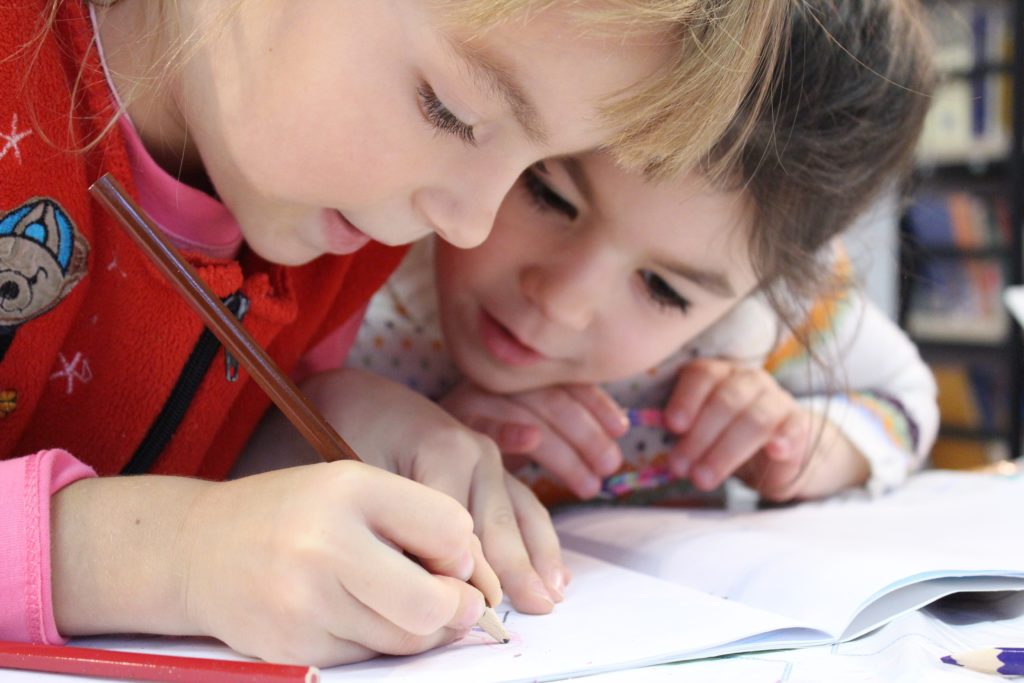It’s here already! How did you get to this place so quickly? This is the summer before your little sweetie goes to kindergarten, and whether you’re excited, scared, tearful, or all of the above, you’re probably wondering what you can do to prepare your child for kindergarten.
First things first. Don’t get stressed out this summer about getting your child ready for kindergarten. This should be a fun and exciting time of life. Don’t feel pressure to push your child to meet milestones. Remember that your child learns a lot every day through play, routine, and observing life. Your child is soaking up knowledge simply by talking with you each day.
{Pretend Away! Why Your Child Needs Pretend Play}
The following items aren’t meant to overwhelm. Rather, keep them in mind and try to incorporate them throughout your summer days. We’ll give you tips on how to do that. Keep reading!
1. Have Play Dates
In kindergarten, your child will need to know, and continue to learn, how to share, take turns, respect other people’s bodies and property, and more. Play dates, whether formally set up with parents in attendance or casual playtime with the neighbors, are helpful for developing these social skills. Give your child opportunities to play with other kids her age this summer.
2. Practice Name Writing
Your child will need to write his name on his kindergarten work, so take the time now to let him practice both his first and last name. You can buy a special notebook, or just use loose-leaf paper. Or have him practice with sidewalk chalk or paint. Let him spell it out with pretzels or raisins at snack time. Ask him to spell his name as you’re driving in the car.
3. Practice Letters and Numbers
Find opportunities to practice letter and number identification. This doesn’t have to always mean worksheets. Point out letters in your daily life, encourage your child to sound out words on the cereal box, ask her what letter comes next in the alphabet, and encourage her to write the names of her family members or her favorite toys.
Count items out loud, challenge your child to count as high as he can, and ask him to identify numbers in addresses as your drive.
{8 Ways to Lose the Flaschards: Make Alphabet Learning Fun}
4. Teach Your Phone Number and Address
By kindergarten, your child should have a good handle on his phone number and address. One simple way to teach these is to set them to the tune of a simple song. Try “Mary Had a Little Lamb” or “Twinkle, Twinkle, Little Star.” Then, as you go about your day, sing your phone number or address. Sing it while you prepare lunch, while you’re driving in the car, when you take a walk, etc. After your child has heard it, encourage him to sing along.
Let your child type your phone number into your phone.
To help your child write her phone number, post it where she can see and get familiar with its appearance. Let her trace the numbers. Encourage her to copy the numbers. Eventually, ask her to write the phone number and address from memory. Praise her for her efforts, even if she doesn’t get it perfectly. Give her plenty of opportunities to try again!
5. Read
Reading is a crucial skill for every person, and while your child doesn’t need to be independently reading before kindergarten, exposure to books and reading in all forms is going to help with his future academics.
Incorporate reading into all aspects of your day. Pick a regular time each day to read to your child. If she can read, select books at her level and ask her to read them to you. Encourage her to look at or read books on her own.
Let your child see you read a recipe, read a map, read street signs, read books, and more. Bring your child into your reading world by pointing to the words in the recipe as he looks over your shoulder. Ask him to help you find a street name by telling him the first letter to look for. See if he can find the letters of his name as you run errands.
{8 Ways to Help Your Preschooler Fall in Love with Reading}
6. Do Chores
Chores are a great way to teach your child responsibility, as well as following directions — two things she’ll need to have a handle on in kindergarten. Every family does chores differently, but figure out your rhythm. There are certain chores, like making the bed, that can automatically be done every day. And then you can add additional weekly chores or projects that make sense for your child.
You can have your child set the table, weed the garden, make her bed, fold his laundry, feed the cat, help prepare meals, sweep, vacuum, empty wastebaskets, dust, and more. Remember it will take time to learn how to do the chores properly.
7. Work on Independent Tasks
In kindergarten, your child will need to use the restroom by himself, so use the summer before kindergarten to make sure he’s able to do all the required steps. Help him learn how to button and unbutton, zip, put on and take off a coat, and tie shoes. Just take one skill at a time, and help him work on it each day.
8. Eat Independently
If your child will be eating snacks or lunch at school, make sure she can eat the whole meal on her own. Can she unzip and zip her lunchbox? Open her packaged snacks? Open and close storage containers? Use plastic forks or spoons? A great way to make sure she has these skills is to eat lunch out of her lunch box a few times throughout the summer.
9. Have Lots of Free Time
Remember to give your child plenty of free play time. Children learn best by playing, and much of preparing your child for kindergarten actually will come in the everyday, informal moments. Plus, your child needs time to be herself and be confident in who she is, and free time is likely to give that to her.
Always remember: It isn’t a race. Let your child progress and develop at his own speed while you work to prepare your child for kindergarten.


